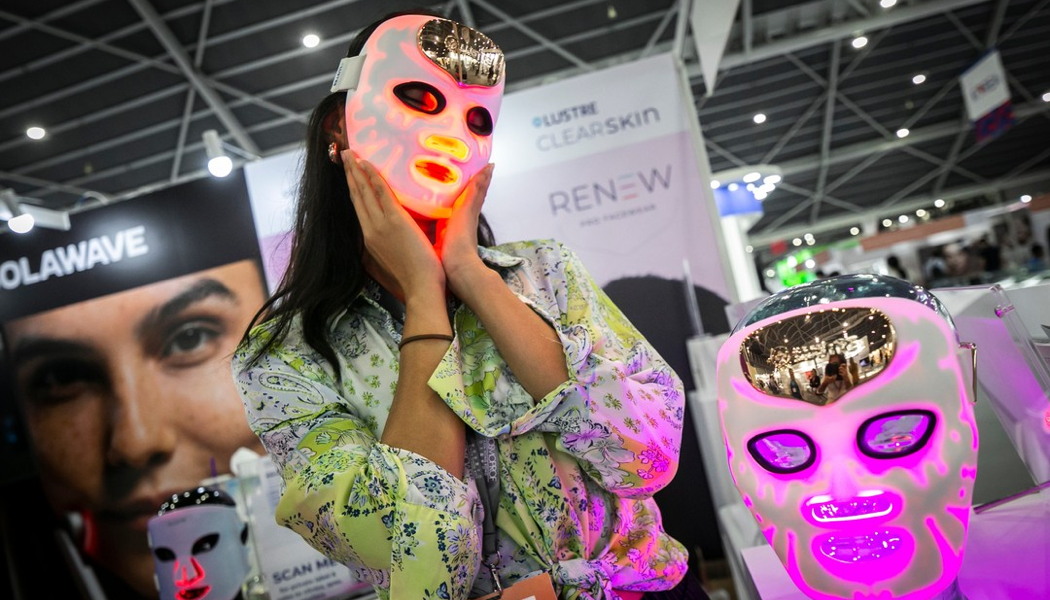Minimally invasive skin care: slowing down the need for plastic surgery
Minimally invasive beauty was one of the most visible trends at the trade fair – and a key trend highlighted by trend forecaster Beautystreams in its Cosmoprof Asia 2022 Trends report. The trend encompasses highly sophisticated cosmeceuticals that promise to keep face and skin looking younger for longer, delaying the need for actual invasive beauty treatments such as plastic surgery.
This new generation of functional face care is based on the latest biotechnological advances featuring innovations like freeze-dryed actives (to improve stability), cutting-edge delivery systems to allow ingredients to penetrate more deeply into the skin than ever, skin boosters that have a filler-like effect or self-dissolving micro-needle patches.
Singapore brand Invity‘s SuperNAD Youth Activating Sheet Mask, for example, is described as the world’s first sheet mask to contain the cell-energising molecule NAD (Nicotinamide Adenosine Dinucleotide). And Korean brand Coscoco new Medipair Collagen Veil Ampoule treatment kit contains five ampoules with a bioactive collagen booster said to improve skin health.
Cellicon Lab‘s latest face care launches are based on the cell-to-cell DermiShuttle delivery system said to increase the efficacy of its cosmetic actives. The brand’s new PermeaCell Lifting Kit combines freeze-dried powdered ingredients that are “activated” with a liquid ampoule. And Dermafirm’s RX Melavita-C Exosome Cream is a brightening cream formulated with seven skin-boosting ingredients and a liposome-based delivery technology.
Dissolving micro-needle patches are another interesting ingredient delivery system. In this face care technology, the active ingredients are manufactured into ultra-thin spikes which are attached to patches. The micro-needle patch is then applied to the skin with a light pressure, causing the ingredients spikes to slightly pierce the top layer of the skin and dissolve, allowing the actives to penetrate the skin more effectively than a topically applied serum. Several Korean exhibitors presented this kind of beauty tech, like Endoderma which showcased its most recent launch, comma-shaped undereye patches containing AHP-8 and caffeine to improve skin firmness and elasticity.
Most trendy ingredients: Bakuchiol and EGF
While functional beauty is not a new trend, of course, beauty products and face care in particular are becoming more high-tech and effective every year. Certain ingredients stood out in particular at Cosmoprof Asia 2022, like EGF (Epidermal Growth Factor) which made an appearance at quite a few exhibitors‘ booths.
Korean brand Reblocell, for example, presented its new Flossom Regenerating Sheet mask which the brand says has been saturated with the equivalent of four EGF ampoules. Fellow Korean brand EGFology also introduced an EGF face mask kit which comprises a bio-cellulose mask and an EGF ampoule. And Belgian brand Celestetic newest EGF launch is a Hydra Mist facial spray in which the EGF amino acids are combined with other functional actives, like niacinamide and panthenol.
Bakuchiol – often described as a “plant-based retinol” – has been trending in Western European and US beauty for a while. Now this ingredient seems to be taking off amongst Asian brands, too, with at least half a dozen K-beauty brands presenting bakuchiol serums and creams, usually combined with a vegan claim.
Tinazana launched a new vegan bakuchiol serum and a bakuchiol cream. The serum is a dual-phase product formulated with bakuchiol, trehalose, panthenol and almond oil, tocopherol and lithospermum erythrorhizon extract. Fellow Korean brand Celestyn recently introduced a 3-sku bakuchiol-based range formulated with 1% plant-based retinol, retinol and multipeptides. Bunio has also just brought out a bakuchiol serum, as did Eleven Huesday with its new V-Renewal Bakuchiol cream which contains 1% bakuchiol as well as three types of collagen, peptides and retinol.
Taking care of the skin microbiome
Cosmetic products that focus on boosting and protecting the skin’s microbiome have been a massively growing global trend for the last few years. Probiotic, prebiotics and ferments played the leading role in beauty launches at the Cosmoprof Asia show this year, often with the word “biome” strategically used as part of the product or brand name.
Russian beauty brand Natura Siberica, for example, presented its new Lab Biome range. The brand‘s Lab Biome Rejuvenating Face Serum is formulated with 1% postbiotic actives derived from fermented Northern cloudberry (Rubus chamaemorus) and wild raspberry extracts while the Happy Age Anti-Ageing Serum, French indie brand Demain’s most recent launch contains natural prebiotics and postbiotics.
However, microbiome-centred launches were also highly visible amongst the Asian exhibitors at the show, like Korean brands Farmstay with its new Tea Tree Biome Calming Serum and IsnTree (http://www.isntree.com/) with the recently launched Yam Root Vegan Milk Toner which is said to help repair and protect the skin’s barrier. Malaysian brand Sky Resources has also launched a microbiome-focused face care range this year. The brand’s Rebiome Sunscreen, for instance, is formulated with polylysine said to actively boost beneficial skin bacteria.
Next year Cosmoprof Asia is due to return to Hong Kong, taking place from 14th to 17th November 2023.
